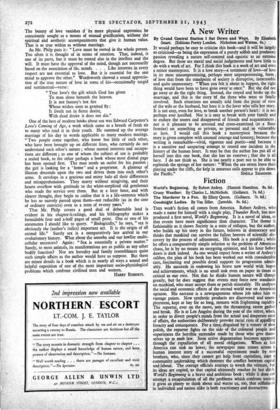Fiction
THIS week's fiction all comes from America. Robert Ardrey, who made a name for himself with a single play, Thunder Rock, has now produced a first novel, World's Beginning. It is a novel of ideas, so that events have more significance than character. The theme is fashionable as it shows Society in a state of collapse, but the author, who builds up his story in the future, believes in democracy and thinks that mankind can survive the fullest horrors of scientific dis- covery by the process of adjustment. His book is a parable ; while he offers a comparatively simple solution to the problem of American chaos, he is by no means an easygoing optimist, and his hour before dawn is dark indeed. As one would expect from a writer of Ardrey's calibre, the plan of his book has been worked out with considerable care, fascinating and possible detail support its progression admir- ably. He succeeds in endowing his brave new world with hopes and achievements, which is no small task even on paper in times as critical as our own. Not that he thinks human nature will change greatly, but he does suggest that events may force new standards on mankind, who must accept them or perish miserably. He analyses the social and economic effects of the second world war on American opinion. His narrator is a newspaperman whose job takes him to vantage points. New synthetic products are discovered and unem- ployment, kept at bay for so long, mounts with frightening rapidity. The reporter, ever on the move, sees the threatening storm gather and break. He is at Los Angeles during the year of the terror, when, in order to divert people's minds from the actual and desperate state of affairs, the authorities deliberately provoke racial riots of appalling ferocity and consequence. For a time, disguised by a veneer of shoe polish, the reporter fights on the side of the coloured people and experiences the horrible surrender made by those who give them- selves up to mob law. Soon active degeneration becomes apparent through the repudiation of all moral obligations. When at last America can sink no lower, the newspaper man comes across a human interest story of a successful experiment made by two brothers, who, since they cannot get help from capitalists, start a community undertaking which destroys the conflict between capital and labour. The corrupt officials attempt to wreck the venture, I-ut its ideas are copied, so that capital ultimately reaches its last ditch. World's Beginning is a brave and ambitious book ; while it does Lot attempt a recapitulation of all the problems which confront sociciy, it gives us plenty to think about and warns us, too, that selfishiLss in individual and nation alike is both reactionary and destructive. Charles McNichols' Crazy Weather is also an adventure story, which, if a more conventional type, is none the less attractive, since it takes us into unfamiliar country in the company of a boy, a lively and spirited lad. When the opportunity occurs he sets out with a young Majave Indian of about his own age in quest of an interpre- tation of a dream. The hero of this swift and lively narrative is a genuine boy, with all the heedless zest and charm of youth. The dream message, South Boy learns, is to find a new name for himself other than the one given him by the Indians. So he and Hayek set out on the long trek into strange country which is inhabited by the hostile tribe of Puite Indians. On their way they visit the camp of the Whisperer, where South Boy meets the sister of the native woman who suckled him. Armed with a new wonderful bow and the woman's blessing they continue the journey. Their return home has its own perils and excitements. This is a story which should appeal to any man who has ever enjoyed a book about cowboys and Indians.
The new Ellery Queen is an improvement on his last, for there is less wise-cracking and more hard work in The Murderer is a Fox, though many of his addicts are going to be upset by the anti-climax which provides a solution to the mystery. Characterisation is well done, the story tense and exciting, with a war-time background. The hero is a neurotic airman who thinks he has inherited wife-killing traits from his papa. He and his young wife are getting more and more desperate, then the case is reopened, the corpse skilfully exhumed and papa exonerated. A very neat piece of work, if not quite satisfying to fox-hunters.
Goodnight Ladies is both slick and clumsy and contains the most heartless philanderer who ever played a hero's part in murder. The scene is war-time Washington. Lieutenant Rance, having dis- appointed a young woman who tried to pick him up, returns to his apartment to find the predatory female in his room-mate's bed. She is dead. The plot thickens rapidly with plenty of complications, including blackmail and another corpse. Solution and psychology both dubious and strained, though the story has its moments.
JOHN HAMPSON.























 Previous page
Previous page